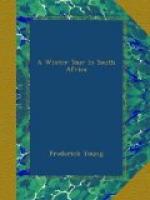In fact, as a field for settlement, I entirely concur with the remarks of Mr. John Mackenzie, who has worked for so many years in Bechuanaland, and who states in his recent work, entitled, “Austral Africa”—
“I come now to give my own thoughts as to the capabilities of Bechuanaland as a field for colonisation. My mind reverts at once to thrifty, and laborious people who are battling for dear-life on some small holding in England or Scotland, and who can barely make ends meet. I do not think that any class of men, or men of any colour, endure such hardships in South Africa. There are portions of Bechuanaland where, in my opinion, a body of some hundreds of agricultural emigrants would, like the Scottish settlers in Baviaan’s river, some sixty years ago, take root from the first, and make for themselves homes. If they came in considerable numbers, and accompanied by a minister of religion, and possibly a schoolmaster, the children would not be losers by the change, while the church and school-house would form that centre in South Africa, with which all are familiar in Scotland, and give the people from the first a feeling of home. I would not suggest that such men should be merely agriculturists, but that like most farmers in South Africa they should follow both branches of farming. They would begin with some sheep, or angora goats, and a few cows. In the first instance they would have a freehold in the village, with right of pasturage, and they would also have their farm itself in the neighbourhood, the size of which would depend upon its locality and capabilities. But with the milk of his stock and the produce of his land in maize, millet and pumpkins, the farmer and his family would be, from the first, beyond the reach of want.”
For two days more we travelled through the same kind of country, a fine, bold, and very extensive plain (a promising district for cattle farming), with rolling and undulating hills in the distance, till we reached Vryburg, about a hundred and forty-five miles—in four days—from Kimberley. This is the capital of British Bechuanaland, and the head-quarters of Sir Sidney Shippard, the Administrator. The town itself contains about 500 inhabitants, chiefly Europeans. Here we spent four days. On one of these I was taken by Mr. M—— to visit his fine Bechuanaland farm of 6,000 morgen—12,000 acres—which he has named “Lochnagar.” We left Vryburg at 7.30 a.m., and drove about twelve miles in the direction of Kuruman, reaching Lochnagar Farm about 10 o’clock. While breakfast was preparing, Mr. M—— took me round the nearest part of this excellent and valuable farm. He has had it about three years, and he has already shown the wonderful capabilities for development which an enterprising proprietor, possessed of some capital, can evolve from farms in Bechuanaland. He first took me into his fruit garden, which he has stocked with fruits of all descriptions. I was particularly struck with the healthy appearance of the wood (it was then the middle of winter) of the trees of all sorts of fruit. He has planted mulberry, apple, pear, apricot, peach, orange, citron, and several other fruits, all of which seem to be growing fast, and taking root vigorously in the soil. A large space is also devoted to a vineyard, as well as another to an orchard.




